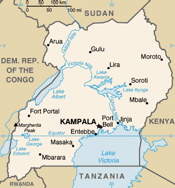KAMPALA, Uganda -- As a young bride from a village in Uganda, Annet Nyakisiki never imagined she might one day be the sole breadwinner for an HIV-positive family. But while she was a virgin at the time of her marriage, her husband, 10 years her senior, was not. There is no way to know exactly when he contracted the AIDS virus, but he did. He subsequently spread it to her, and all four of their children would eventually be born with the disease. "When I found out that we were all positive, I thought, We have no future," admits Nyakisiki, a small, lively, round-faced woman in her thirties. "I thought about poisoning us all."
Uganda has been touted as Africa's most successful country in reducing HIV infection rates, both by its government, which is eager to gain international approval, and by the Bush administration, which funds the controversial abstinence-based "ABC" campaign that now dominates HIV prevention efforts in Uganda and much of Africa. But since abstinence advice is considered irrelevant for married women, and married couples are the least likely to use condoms to prevent infection, experts now consider married women among the most at-risk Ugandans for contracting HIV, a factor that could be contributing to Uganda's current failure to curb rates of new infections.
"We're seeing the epidemic shift from young women to slightly older married women," said Dr. David Serwadda, director of the Institute of Public Health at Makerere University in Kampala. "Increasingly, people assume that marriage is a safe institution. But there are also extramarital relationships. Married women don't see why they are at risk, yet they are very much at risk."

